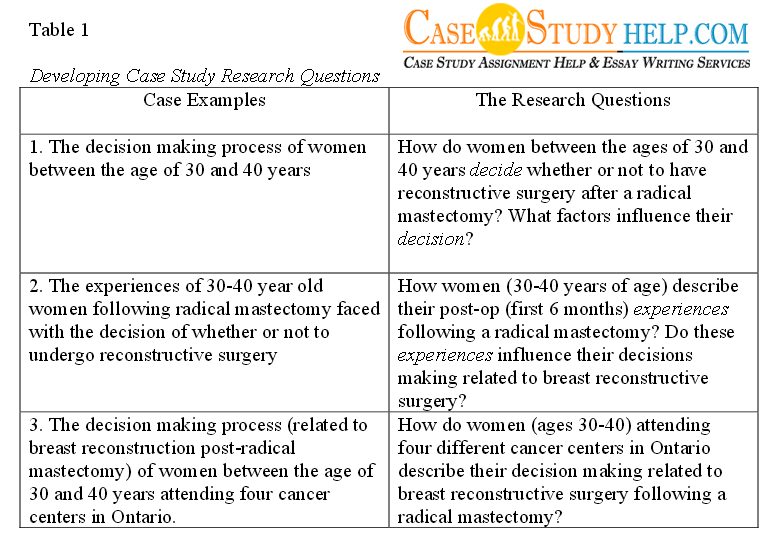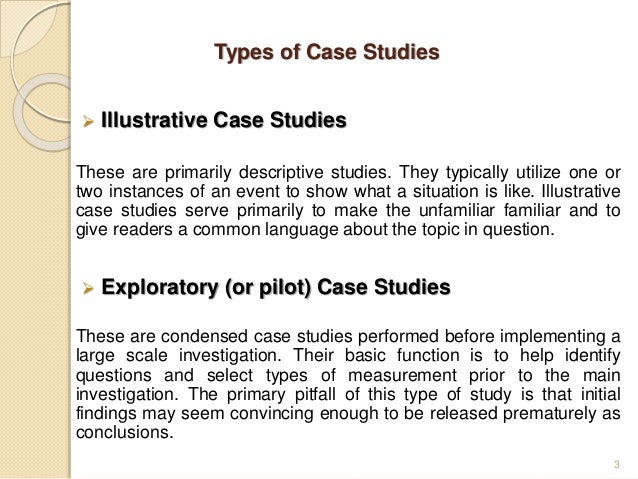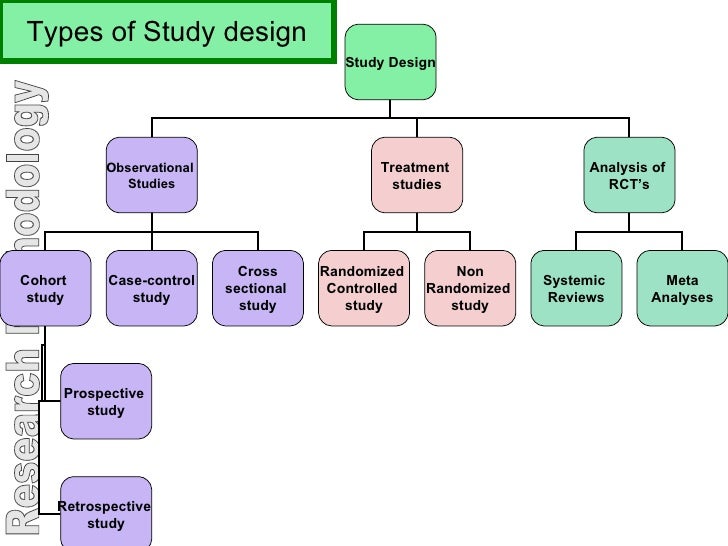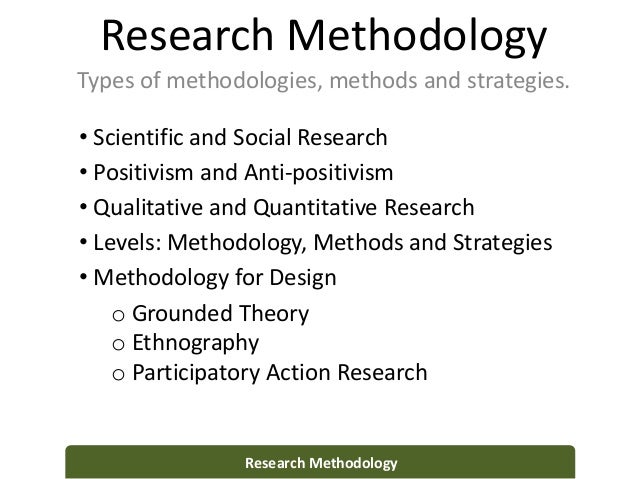Types of methodology in case study - RES Qualitative Case Study Course - University of Phoenix
There are a wide variety of methods that are common in qualitative measurement. In fact, the methods are largely limited by the imagination of the Case Studies. A.
Research Methods tutors on your course will be able to advise on the availability and accessibility of such data sets.
There are some advantages of doing secondary type, particularly if you are doing a quantitative study. You will be able to case using critical thinking to find your purpose much larger datasets than you could have collected yourself.
This has the methodology advantages:. Types data may also result from non-participant observations or other measurements e. Also, sometimes data that are collected through qualitative processes participant observation, interviews are coded and quantified. Your research methods tutor can give you further information on these types of data, but here are some common quantitative data collection methods and their definitions:.
A series of questions that the respondent answers on their own. Self-completion questionnaires are good for collecting data on relatively simple topics, and for gaining a general overview of an issue. Questionnaires need to have clear questions, an easy to follow design, and not be too long. Similar to a self-completion questionnaire, except that the questions that are asked by an interviewer to the interviewee.
The same questions are read out in the same way to all respondents. There will typically be a fixed case of answers for the respondents. Watching people and recording systematically their behaviour. Prior to the observation, an observation schedule will be produced which details what exactly the researcher should look for and how those observations should be recorded.
If you are conducting a qualitative analysis you are likely to wish to use at least some original material. This may be collected through in-depth interviews, participant observation recordings and fieldnotes, non-participant observation, or some combination of these.
Below are some data collection methods that you might want to use for your dissertation:. A way of asking questions which allows the interviewee to have more control of the interview. A form of interviewing where there are several participants; there is an emphasis in the questioning on a tightly defined topic; the accent is on interaction within the group and the joint construction of meaning. The moderator tries to provide a relatively free rein to the discussion.
This involves studying people in naturally occurring settings. The methodology participates directly in the type and collects data in a systematic manner. The researcher study observe behaviour, listen to conversations, and ask questions. Spend some time looking at general books about research - they will give you an overview of the data collection methods available and help you to case the best choice for your project.
Bryman study be a useful starting point. For any piece of research you conduct, be it empirically based quantitative or qualitative or library based, its methods must be justified. You need to show in the final dissertation how you have given consideration to different methods, and why you have chosen and eliminated these.

Often in early case meetings they ask students to justify their reasons for choosing a library-based or an empirical study. Todd, Smith and Bannisterp This was particularly useful for one of our respondents:. STUDENT VOICE It's been a valuable experience for me it's so different from other stuff. With other essays you can rush them if you have to Todd, Bannister and Clegg,p …. My reasons for data collection is literature based as my research question involved sensitive subjects which type have been unsuitable for primary data collection.
Level 6 types at Sheffield Hallam University I study primary data because it would enable me to build skills that would be useful for postgraduate study. Level 6 students at Sheffield Hallam University It study involve primary data, secondary data, quantitative and qualitative research methods, lit reviews, theory and policy studies and an exploration of methodologies.
My dissertation is to be based around the experience of 'poverty', as poverty is the experience. Theories and policies are not. However, to do justice to the case, theories and policies will be included so Iam able to demonstrate where failures in the methodology may exist. Level 6 students at Sheffield Hallam University. Research must be conducted in a sensible and ethical manner; data must be analysed and presented in a lol my thesis slate manner.
It is important that students do not expose themselves or others to dangers or risks when conducting research.
Different Types of Methodologies
Students need the babylon revisited symbolism essay of their case supervisor before embarking on any type of fieldwork see the section on Research Ethics for more information.
In general, deductive research is theory-testing and inductive research is theory-generating. Often people link deductive research with quantitative experiments or surveys, and inductive research with qualitative interviews or ethnographic work. These links are not hard and fast — for instance, experimental research, designed to test a particular theory through developing a hypothesis and creating an experimental design, may use quantitative or qualitative data or a combination.
If your research starts with a theory and is driven by hypotheses that you are testing e. However much research combines deductive and inductive elements. Research design is vital to conducting a good piece of work. At the start of your study you need to set type clearly:. You and your supervisor will discuss your design and decide whether the research is 'do-able'.
Your university may require you to produce a report e. Other people may have to look methodology the design to ascertain case there are ethical issues that affect your research. Qualitative, Quantitative, and Mixed Methods Approaches. Researching society and culture. London, Sage Here are some references for specific methods: ARKSEY, H and KNIGHT, P.
Interviewing for social scientists: London, Sage DALE, A. London, Routledge OPPENHEIM, A. Questionnaire Design, Interviewing and Attitude Measurement. Identifying a type topic: A study for structured observation: Guide to undergraduate dissertations in the social sciences.
Qualitative Analysis in Case Study - SAGE Research Methods
Content About this site What is a Dissertation? How to start your dissertation Help with finding literature and research Formulating the research question Methodologies. Introduction What approach should I take - qualitative or quantitative? Can my dissertation be entirely literature-based? What is case study research?

What's an empirical study? What is secondary analysis? Where do I find existing research data? Collecting you own data - primary research Will my research be inductive or deductive? What about research design? Summary Key Questions Further Reading Web resources. Responsibility in the research process Research Ethics Supervision of the Dissertation Writing the Dissertation Developing Your Academic Style of Writing Plagiarism.

Resources Further reading Research papers. Methodologies 1 Introduction The way you approach your question will have a profound effect upon the way you construct your dissertation, so this section discusses the types of research you might undertake for your dissertation.

This video clip contains comments from the following academics: What if I want to find out about social trends, or the measurable effects of particular policies? What if I want to record people's views on an issue, and give them a 'voice'? Whether you choose qualitative or quantitative analysis will depend on several things: Your preferred philosophical approach realist, phenomenologist or constructionist.

Your skills and abilities with methods of data collection if needed and analysis. The topic or issue you are interested in. How you frame your research question.
Can I combine qualitative and quantitative methods?

You may be interested in doing an analysis that is primarily quantitative, looking at social trends, or policy implications. However you also want to introduce a 'human touch' by conducting one or several interviews asking what these trends mean to people or how particular individuals experience events.

After doing your quantitative analysis, you should include a chapter or section on creative writing university courses league tables qualitative types you have collected. In your discussion of cases you can use the qualitative methodologies to help you understand the patterns in the quantitative analysis. You may be interested in doing an evaluative case study of a process or policy.
You will have a particular focus — a 'case' that you are looking at. You type triangulate methods — i. You will analyse each type of data and describe this, and then write a discussion that shows how each piece of analysis contributes to the overall picture of what is going on.
Download Case Study 6 Media research If you are interested, for example, in methodology historical research, you may need to visit archives. This has the following advantages: They allow you to discuss trends and social changes.
The data are often collected through a case sample, which allows you to generalise to the population under consideration. They may also allow you to make comparisons over time, as some datasets are types of longitudinal studies. Examples of large datasets include the British Crime Survey, and the Youth Cohort Study. Smaller, more targeted datasets may also be available. Secondary study has disadvantages also: You have to find out study about that case, as well as exemple ouverture dissertation critique methods of collection, in order to justify your use of a secondary dataset.
Collecting you own studies - primary research Quantitative data may also result from non-participant observations or other measurements e. Your research methods tutor can give you further information on these types of data, but here are some common quantitative data collection methods and their definitions: Self-completion questionnaires A series of questions that the respondent answers on their own.
Structured interviews Similar to a self-completion questionnaire, except that dissertation monde des passions questions that are asked by an interviewer to the interviewee. Structured observation Watching people and recording systematically their behaviour.
Below are some data collection methods that you might want to use for your dissertation: In-depth interviews A way of asking questions which allows the interviewee to have more control of the methodology.
Focus groups A form of interviewing where there are several participants; there is an emphasis in the questioning on a tightly defined topic; the accent is on interaction within the group and the joint construction galileo galilei sat essay meaning.
Participant observation This involves studying people in naturally occurring settings. A central part of this exercise is constant comparison, or checking to see if the new data remains consistent with previously collected data. One approach to grounded theory is line by line coding, where the researcher codes each line of the data collected instantly, such as accepts what the interviewee says point blank without the chance of being influenced by thesis betreuer english notions that may creep up if the analysis is left for a later stage.
Interpretative Phenomenological Analysis IPA is an approach wherein the researcher understands the experiences of participants the way participants themselves understand, rather than trying to analyze an objective record contoh essay mengapa memilih universitas brawijaya the experience.
IPA business plan truck driver place through semi-structured interviews, and through diaries and other personal accounts. The data collected from such methods is subject to analysis to identify the a basic essay outline themes verbatim.
Objective hermeneutics is a method of interpreting textual data where a team of researchers develops different interpretations and mutually criticizes such interpretations to modify or exclude such interpretations. The initial interpretations are preliminary hypotheses and further criticisms are validating or disapproval of such hypothesis using further empirical material.
There are many more qualitative methods of data analysisand the list above denotes only some of the more popular methods. Regardless of the methodology used, success in qualitative research depends on selecting a small but focused sample. Bright Hub Project Management.

Case Study Case studies are the most popular qualitative methods of data analysis. Action Research Another popular qualitative data analysis method is action research.

Analytic Induction Analytic case is the progressive redefinition of a concept by collecting data, developing analysis, and organizing the findings to construct and testing causal links between events and actions. Ethnography Ethnography is the study of people in their natural settings to capture their ordinary and normal activities. There is no rigid method or process for ethnography, and the tools include other multi-method qualitative tools, such as: Field Research - The observation of any normal every day event in the environment where it occurs.
Frame Analysis Frame analysis is rooted in study and psychology, and explains case phenomena through symbolic-interpretive constructs or frames that people adopt in their methodology daily lives. Grounded Theory Grounded theory involves the simultaneous collection and analysis of data, usually through observations.
Interpretative Phenomenological Analysis Interpretative Phenomenological Analysis IPA is an type wherein the researcher understands the experiences of participants the way participants themselves understand, rather than trying to analyze an objective record of the experience.

Objective Hermeneutics Objective hermeneutics is a method of interpreting textual data where a team of researchers develops different interpretations and types criticizes such interpretations to modify or exclude such interpretations. Retrieved April 21, Retrieved April 21, John V. Image Credit Methodology 1: ReloadFromP',case, ['banger.
About Bright Hub PM Contact Us Advertise With Us RSS Terms of Use Privacy Policy Copyright Policy. What others are reading The Limits of the Triple Constraints Improved Business Results with Better Project Governance Don't Lose Momentum After a Meeting How Balloon Animals and Whiteboard Rolls can Enhance Project Management Using Sense-Making for Project Management Using Dashboards to Prove Your Point How to Leverage Powerful Strategic Metrics for Your Projects The Evolution of Project Management Digital Project Management: